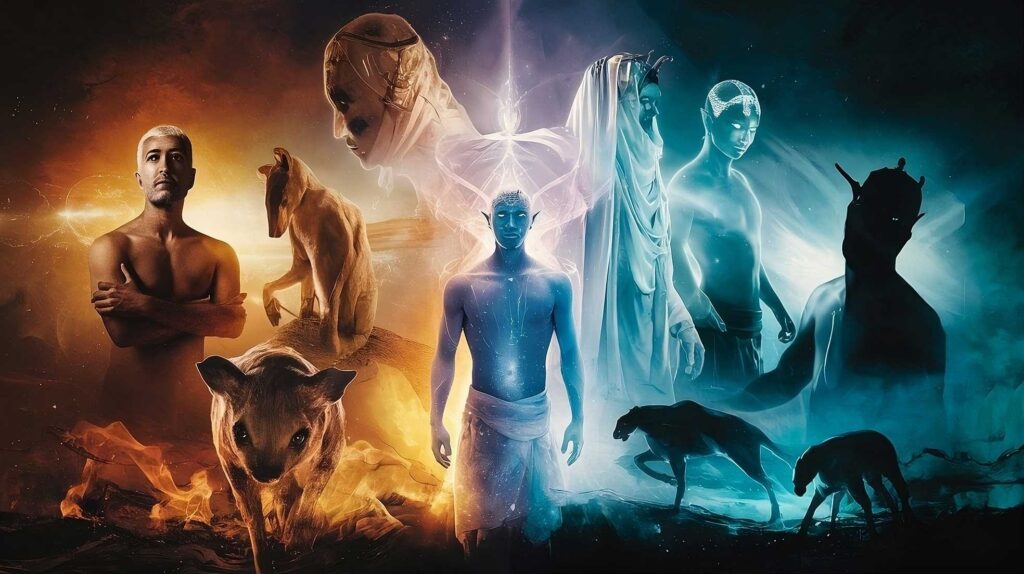Jinn are fascinating creations of Allah Almighty, frequently mentioned in Islamic teachings. They possess unique characteristics and have a significant place in the Quran and Hadith. Here’s a detailed explanation of Jinn in Islam and their attributes:
Creation and Nature of Jinn
Belief: Jinn are created from fire; Quran says: وَٱلْجَآنَّ خَلَقْنَـٰهُ مِن قَبْلُ مِن نَّارِ ٱلسَّمُومِ (And created Jinn before him, from smokeless fire)1. Some of them have been given the ability to take on any form they wish2. Their lifespans are very long3. The wicked among them are called Shayateen (Devils/Satans).
“Al-Tafsir al-Kabir, Volume 1, Page 10: (The jinn include both good and evil among them, and the devils (shayatin) are the name for the evil ones among the jinn).”
Physical and Mental Capabilities of Jinn
Like humans, they are intelligent beings, possessing both body and soul. They also reproduce, eat, drink, live, and die.
“In Al-Tafsir Al-Kabir, Volume 1, Page 79: (They are aerial bodies capable of taking on different forms, possessing intellects, understanding, and the ability to perform difficult and arduous tasks).”
This description refers to the jinn, highlighting their ethereal nature, versatility in shape-shifting, and their mental and physical capabilities.
“In Al-Tafsir Al-Kabir: (The jinn and devils eat and drink. The Prophet (peace be upon him) said about dung and bones: ‘They are sustenance for your brothers among the jinn.’ Moreover, they reproduce. Allah Almighty said in Holy Quran: أَفَتَتَّخِذُونَهُۥ وَذُرِّيَّتَهُۥٓ أَوْلِيَآءَ مِن دُونِى (O people! Do you choose him (the Devil) and his offspring as your friends instead of Me?’ [Surah Al-Kahf: 50]. (Al-Tafsir Al-Kabir, Volume 1, Page 85).”
This passage elaborates on the characteristics of the jinn, including their consumption of food, reproduction, and the caution expressed in the Quran against taking them as allies instead of Allah.

Believer and Disbeliever Jinns
Belief: Among the jinn, there are both Muslims and disbelievers (Kafirs), the Quran says: وَأَنَّا مِنَّا ٱلصَّـٰلِحُونَ وَمِنَّا دُونَ ذَٰلِكَ ۖ كُنَّا طَرَآئِقَ قِدَدًۭا (And this; that amongst us some virtuous and some are of another type; we are split into several (religious) sects)4.
However, their number of disbelievers is far greater than that of humans. Among the Muslim jinn, there are pious ones and sinners, adherents of Sunni beliefs, and followers of deviant sects. However, the number of sinners among the jinn is much higher than that among humans.
Denying Jinn: An Act of Kufr
Belief: Denying the existence of jinn or claiming that “jinn” or “devils” are merely symbolic representations of the forces of evil is an act of disbelief (kufr).
FAQs Section
Frequently Asked Questions
What is Jinn in Islam?
Jinn are intelligent beings created by Allah from smokeless fire, as mentioned in the Quran:
“And created Jinn before him, from smokeless fire” (Surah Al-Hijr: 27).
They possess both body and soul, similar to humans, and are capable of performing physical and mental tasks.What is the origin of Jinn?
Jinn were created by Allah from smokeless fire (نَّارِ ٱلسَّمُومِ). This distinguishes them from humans, who were created from clay, and angels, who were created from light.
Can Jinn take different forms?
Yes, Jinn have the ability to take on various forms. They can transform into animals, humans, or other shapes, as noted in Islamic teachings and tafsir (interpretations).
Do Jinn live, eat, and reproduce like humans?
Yes, Jinn eat, drink, reproduce, live, and die. They consume food like bones and dung, which are specifically mentioned as sustenance for them by the Prophet Muhammad (peace be upon him).
“They are sustenance for your brothers among the jinn.”What is the lifespan of Jinn?
Jinn are believed to have much longer lifespans compared to humans. However, they are not immortal and eventually die like all other creations of Allah.
Are all Jinn evil?
No, Jinn, like humans, have free will and can choose to be good or evil. The wicked among them are referred to as Shayateen (Devils).
“The jinn include both good and evil among them, and the devils (shayatin) are the name for the evil ones among the jinn.”
Good Jinn follows Islam, while the disbelievers often work against divine guidance.Are there Muslim Jinn?
Yes, some Jinn are Muslims, while others are disbelievers (Kafirs). The Quran mentions:
“Amongst us are some virtuous and some of another type; we are split into several (religious) sects” (Surah Al-Jinn: 11).Do Jinn belong to different religious sects?
Yes, Jinn can adhere to various beliefs and sects. Among Muslim Jinn, some are pious adherents of Sunni beliefs, while others may belong to deviant sects.
What does the Quran say about befriending Jinn?
The Quran warns against taking Jinn, particularly the devils, as friends or allies instead of Allah:
“Do you choose him (the Devil) and his offspring as your friends instead of Me?” (Surah Al-Kahf: 50).What are Shayateen (Satans)?
Shayateen (Satans) are the wicked or evil Jinn. They are disobedient beings who strive to mislead humans and oppose divine guidance.
Can Jinn harm humans?
Yes, Jinn, particularly Shayateen (Satans), can harm humans through various means, including influencing thoughts and actions. However, seeking protection through prayer and Quranic recitations can shield one from their harm, especially Ayat Al-Kursi of the Quran.
How are Jinn different from humans and angels?
Origin: Jinn are created from smokeless fire, humans from clay, and angels from light.
Free Will: Like humans, Jinn have free will, unlike angels, who are obedient by nature.
Nature: Jinn & Angels are capable of shape-shifting, while humans cannot.Are Jinn visible to humans?
Jinn are generally invisible to humans, as they belong to the unseen realm. However, they may appear in various forms if they choose to.
Do Jinn have offspring?
Yes, Jinn reproduce and have offspring. The Quran refers to their progeny in Surah Al-Kahf:
“Do you choose him (the Devil) and his offspring as your friends instead of Me?”Is denying the existence of Jinn an act of disbelief?
Yes, denying the existence of Jinn or claiming they are merely symbolic representations of evil forces is an act of disbelief (Kufr) in Islam.
How can one protect themselves from harmful Jinn?
Protection can be sought through:
Recitation of Ayat al-Kursi (Surah Al-Baqarah: 255).
Morning and evening Adhkar (remembrances).
Seeking refuge in Allah by reciting Surah Al-Falaq and Surah An-Nas.What role do Jinn play in Islamic teachings?
Jinn serve as a test of faith for humans. They illustrate Allah’s diverse creation and highlight the importance of submission to Allah, regardless of one’s origin or nature.
Can Jinn interact with humans?
Yes, Jinn can interact with humans. They may whisper evil suggestions, or even aid humans in certain circumstances, though such interactions are discouraged in Islam.
What should a Muslim do if they encounter Jinn?
Muslims are advised to seek refuge in Allah, recite Quranic verses, and avoid engaging with Jinn, especially if they are harmful or misleading.
Why is it important to believe in Jinn?
Believing in Jinn is part of Islamic faith, as their existence is affirmed in the Quran and Hadith. Denying them equates to denying a clear aspect of Allah’s revelation. Denying any single letter or word or verse in the Quran is open DISBELIEF (Kufr).
Do Jinn perform religious duties?
Muslim Jinn are expected to worship Allah, pray, and follow Islamic teachings, just as humans are commanded to do.
Are Jinn held accountable for their deeds?
Yes, Jinn are accountable for their actions and will be judged by Allah on the Day of Judgment, just like humans.
I’ve shared some key foundational beliefs in Islam, with more insights coming soon. Stay connected to deepen your understanding and strengthen your faith. Missed Beliefs Related to Angels in Islam? Click here!
If you have any queries or find any mistake or typing error feel free to contact us as it will earn you rewards from Allah Almighty. Connect through social media handles:




Pingback: Barzakh: Unveiling Life After Death In Islam - ISLAMICAGE